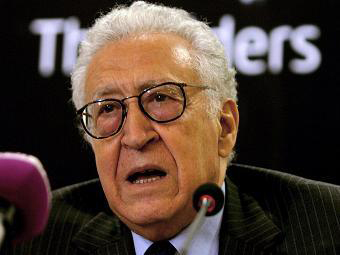International Syria peace envoy Lakhdar Brahimi on Monday said he would travel to Damascus "in a few days" but was not sure whether he would meet President Bashar al-Assad, and noted that his mission was a difficult one, DPA reported.
"I will go to Damascus in a few days and I will meet officials in the capital and outside," Brahimi told a joint press briefing after meeting Arab League chief Nabil al-Arabi in Cairo.
Asked if he would meet al-Assad, he said: "I hope to, but I do not know."
Al-Arabi told reporters that Brahimi would disclose his plan to end the 18-month conflict once he has contacted all concerned parties. The Algerian became the second UN-Arab League Syria envoy after Kofi Annan stepped down last month, over the "continuous finger-pointing and name-calling" at the UN Security Council.
He arrived late Sunday for his first official trip to the region that included a meeting with 22-member pan-Arab bloc, as well as Syrian opposition figures and Egypt's President Mohammed Morsi.
"I am aware it is a very difficult mission, but I think it is not my right to refuse to give whatever assistance I can to the Syrian people," Brahimi said.
A stand-off between the US and Russia at the Security Council on how to end the conflict has cast a shadow over his mission.
Meanwhile, diplomats from Turkey, Saudi Arabia, Iran and Egypt met late Monday in Cairo to prepare for a quartet gathering which is aimed at working out a solution for the Syrian crisis.
The quartet meeting, is an initiative launched by Egypt's new president, Mohammed Morsi, which brings together main supporters of the Syrian opposition, Saudi Arabia, Turkey, and Egypt, with Iran, a staunch ally of Syrian President Bashar al-Assad.
The quartet meeting is aimed at "stopping the bloodshed by launching a political process designed to achieve the aspirations of the Syrian people for freedom and dignity," the Egyptian foreign ministry said in a statement.
UN chief Ban Ki-moon called earlier on the international community to support Brahimi and ensure that those responsible for war crimes in Syria are prosecuted.
"We must ensure that anyone, on any side, who commits war crimes, crimes against humanity or other violations international human rights or humanitarian law is brought to justice," Ban told a meeting of the UN Human Rights Council in Geneva.
Amid the diplomatic efforts, UN High Commissioner for Human Rights Navi Pillay called for an immediate probe into the slaughter of hundreds of people in the Damascus suburb of Daraya on August 26.
"I am deeply shocked by the reports of the massacre in Daraya and I urge an immediate and thorough investigation into this incident," Pillay said.
Some 320 bodies were found last month in houses and basements, according to activists who said most had been "executed" by troops. Syrian state media blamed the killings on "terrorists."
"The use of heavy weapons by the government and the shelling of populated areas have resulted in high numbers of civilian casualties, mass displacement of civilians inside and outside the country and a devastating humanitarian crisis," Pillay added.
More than 100 people were killed across Syria, most of whom in Aleppo province, where rebels and troops are fighting pitched battles for the control of the northern commercial hub, activists said.
The London-based Syrian Observatory for Human Rights said late Monday, that Syrian rebels summarily executed at least 20 soldiers in Aleppo over the weekend.
It said the dead soldiers were captured when rebels attacked a military compound in the eastern district of Hanano, in Aleppo on Saturday.
An Amateur video posted on YouTube and distributed by the watchdog organization showed some 20 bodies lined on a pavement. Most of the soldiers had blindfolds on their eyes and their hands were tied behind their backs before they were shot, the organization said.
The video showed rebels standing next to the bodies holding up a victory sign.
In Paris, Brigadier General Manaf Tlass, a member of al-Assad's inner circle and one of the most senior Syrian army defectors, said on Monday he was against any foreign intervention in Syria.
"I am against all foreign intervention in Syria ... it is up to the Syrian people to achieve their victory and they need to do that themselves," Tlass, who defected from the regime and sought refuge in France in July, told BBC Arabic.
NATO Secretary General Anders Fogh Rasmussen reiterated Monday that the bloc "has no intention to intervene militarily in Syria.. We do believe that the right way forward is to find a political solution" for the crisis in Syria.
Tlass added that opposition Free Syrian Army would eventually be able to oust the regime of al-Assad if it were given the "necessary means." Tlass warned that al-Assad could use chemical weapons if the government felt it was cornered.






